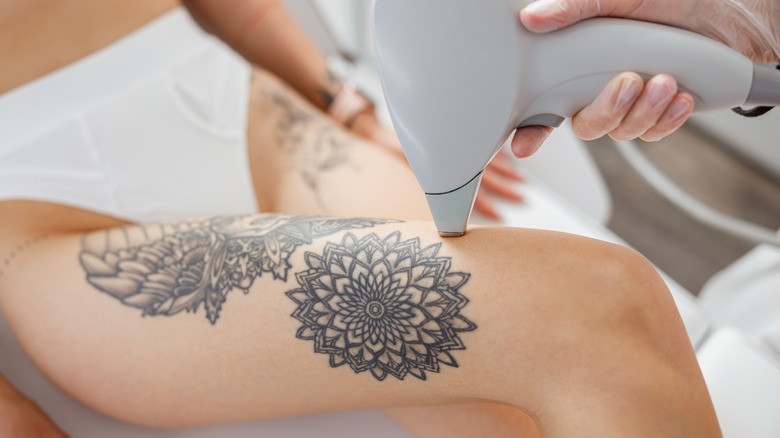How Hard Is It To Permanently Remove Hair Over A Tattoo?
The endless and sometimes painful task of removing hair has long plagued women and femme folks for decades, which is why permanent hair removal has become an increasingly popular cosmetic treatment. Many are appreciating the advantages of hair removal procedures, including the permanency (after receiving multiple treatments), the minimal side effects, the elimination of in-grown hairs, and the cost and convenience of not having to buy razors or schedule frequent waxing sessions. But some folks with tattoos may wonder, will permanent hair removal work for me? And more importantly, is it safe?
There are two main types of permanent hair removal treatments: laser hair removal and electrolysis. During electrolysis, a thin wire is inserted into the hair follicle, delivering an electric current that destroys the root and prevents further hair growth. Whereas, with laser hair removal, a beam of light targets the pigment in your hair, destroying the follicle over time.
For both procedures, dermatologists say once the follicle is destroyed completely, the hair will not return. Laser hair removal, however, works best on dark hair, while electrolysis works on all hair types, including light-colored hairs that laser hair removal can't target. According to dermatologists, electrolysis is a safe method of permanent hair removal for those with tattoos, while laser hair removal is not.
Electrolysis is a safe method to permanently remove hair over tattoos
According to Dr. Michele Green, a board-certified dermatologist in NYC who spoke with Byrdie, "Because electrolysis does not depend on pigment or melanin, it is safe for tattooed areas and white and gray hairs that cannot be treated with laser hair removal." Electrolysis has been shown to be more permanent than laser hair removal, with no maintenance treatments required. It's also effective on all skin and hair types, and is the only permanent hair removal procedure approved by the FDA. Major side effects from electrolysis are uncommon, but there may be some irritation and redness that lasts for a day or so. The major downside of electrolysis is that it might be painful for some people and consists of significantly longer, more frequent sessions than laser hair removal since it targets one hair follicle at a time. Yet, it's still the safer and more effective permanent hair removal option for people with tattoos.
Dr. Green warns against getting laser hair removal over a tattoo, stating, "The laser will detect and target the pigment in the tattoo ink instead of the hair, which can result in a burn, pain, and damage to the skin and tattoo." Having this procedure done over a tattoo is so risky and permanently damaging to your skin that it's highly unlikely you'll find a certified professional to perform it on you. Therefore, if you want to remove hair that's grown over a tattoo and you're unwilling to get electrolysis, you'll have to seek alternative methods.
Pros and cons of non-permanent hair removal options
According to electrologist Dana Elise in an interview with Cosmopolitan, it can take up to 18 electrolysis sessions to permanently remove hair from one area. Multiply this by the average price per electrolysis session (between $50 and $125 per hour), and you'll see that the costs can be significant. If electrolysis doesn't sound appealing to you due to the cost, the pain, and the time you have to dedicate to achieve results, you will have to turn to non-permanent hair removal methods over your tattoo.
The tried-and-true method of shaving is popular for several reasons: it's quick, easy, economical, and generally pain-free. It can, however, lead to razor burn and has to be done often to keep up with hair growth. Depilatories, creams, lotions, or gels that dissolve hair, tend to last longer than shaving and can easily be done at home — but results can vary and some people may experience allergic reactions to the chemicals.
Waxing may be a better option for those who want to extend their hair-free time (as it can last a few weeks), but it can also be painful and cause temporary, minor irritation. Epilators are another hair removal tool that uses rotating tweezers to pull out multiple hairs at once. Since the hairs are being pulled out by the root instead of shaved or cut, your hair will stay gone longer and grow back finer and thinner, according to board-certified dermatologist Dr. Hadley King (via Byrdie). As with waxing, epilating isn't exactly the most comfortable experience. While no method of hair removal is completely perfect, people with tattoos do have safe options they can try — excluding laser hair removal — that will deliver long-lasting results.


